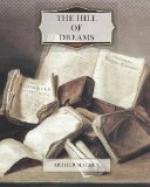A strange feature was the constant and fluttering motion of hands and arms. Gesture made a constant commentary on speech; white fingers, whiter arms, and sleeves of all colours, hovered restlessly, appeared and disappeared with an effect of threads crossing and re-crossing on the loom. And the odor of the place was both curious and memorable; something of the damp cold breath of the cave meeting the hot blast of summer, the strangely mingled aromas of rare wines as they fell plashing and ringing into the cups, the drugged vapor of the East that the priests of Mithras and Isis bore from their steaming temples; these were always strong and dominant. And the women were scented, sometimes with unctuous and overpowering perfumes, and to the artist the experiences of those present were hinted in subtle and delicate nuances of odor.
They drank their wine and caressed all day in the tavern. The women threw their round white arms about their lover’s necks, they intoxicated them with the scent of their hair, the priests muttered their fantastic jargon of Theurgy. And through the sonorous clash of voices there always seemed the ring of the cry:
“Look for the jar marked Faunus; you will be glad.”
Outside, the vine tendrils shook on the white walls glaring in the sunshine; the breeze swept up from the yellow river, pungent with the salt sea savor.
These tavern scenes were often the subject of Lucian’s meditation as he sat amongst the cushions on the marble seat. The rich sound of the voices impressed him above all things, and he saw that words have a far higher reason than the utilitarian office of imparting a man’s thought. The common notion that language and linked words are important only as a means of expression he found a little ridiculous; as if electricity were to be studied solely with the view of “wiring” to people, and all its other properties left unexplored, neglected. Language, he understood, was chiefly important for the beauty of its sounds, by its possession of words resonant, glorious to the ear, by its capacity, when exquisitely arranged, of suggesting wonderful and indefinable impressions, perhaps more ravishing and farther removed from the domain of strict thought than the impressions excited by music itself. Here lay hidden the secret of the sensuous art of literature; it was the secret of suggestion, the art of causing delicious sensation by the use of words. In a way, therefore, literature was independent of thought; the mere English listener, if he had an ear attuned, could recognize the beauty of a splendid Latin phrase.
Here was the explanation of the magic of Lycidas. From the standpoint of the formal understanding it was an affected lament over some wholly uninteresting and unimportant Mr. King; it was full of nonsense about “shepherds” and “flocks” and “muses” and such stale stock of poetry; the introduction of St Peter on a stage thronged with nymphs and river gods was blasphemous, absurd, and, in the worst taste; there were touches of greasy Puritanism, the twang of the conventicle was only too apparent. And Lycidas was probably the most perfect piece of pure literature in existence; because every word and phrase and line were sonorous, ringing and echoing with music.




